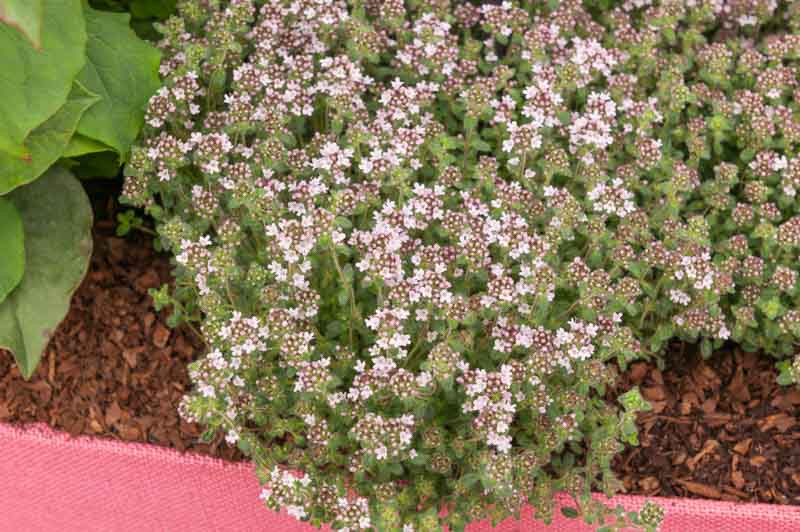•Thymus praecox ssp. arcticus Coccineus (Creeping Thyme) is thought by many to be the most showy groundcover thyme because it has lots of rose-red flowers in the summer and glossy, dark, evergreen leaves. This vigorous and long-lived cultivar is very drought-resistant and has tough woody stems, so it does well in most parts of the country. It looks great planted between flagstones, along walkways, and as an alternative to grass that uses less water. It won the Royal Horticultural Society Award of Garden Merit. arcticus CoccineusAdvantages: It’s good for bees and attracts butterflies; it’s also good for deer and rabbits; it’s a groundcover that’s easy to grow; it’s fragrant; it’s evergreen; it can be used in mass plantings or containers; it grows best in zones 4, 5, 6, 7, and 8. Light Requirements: Full Sun; Soil Moisture: Water-Wise; Water Tolerance: Low-Water; mature height: 2″; spread: 18–30″; bloom time: early to late summer; SKUHC016231
With its carpets of pink blooms and fragrant evergreen foliage, pink creeping thyme adds year-round beauty to gardens. However, in areas with cold winters, this delicate-looking groundcover needs proper care to survive the dormant season and re-emerge even more glorious in spring.
Follow these tips to successfully overwinter pink creeping thyme
Getting to Know Pink Creeping Thyme
There are a few different varieties of pink flowering thyme. including
-
Thymus praecox ‘Coccineus’ – Deep rose-pink blooms in summer over dark green leaves.
-
Thymus serpyllum ‘Pink Chintz’ – Bright salmon-pink flowers in spring
-
Thymus pseudolanuginosus – Soft pink blooms on wooly gray foliage.
No matter the variety, pink creeping thymes share some key traits:
- Evergreen in mild climates, semi-evergreen where winters are cold
- Height of 1-2 inches, spreading width of 18-30 inches
- Dense, woody stems and leathery leaves
- Strong aromatic scent when foliage is brushed or crushed
- Drought tolerant once established
Is Pink Creeping Thyme Winter Hardy?
Pink creeping thyme is rated for USDA Zones 4-10. This means it can withstand winter temps down to -30°F once established. However, its shallow evergreen foliage is vulnerable to desiccation and freeze/thaw cycles in very cold climates. Some tips and protection can help it safely make it through dormancy.
Winter Care Tips for Pink Creeping Thyme
Here are some best practices for overwintering pink creeping thyme:
Leave Foliage Intact
Resist the temptation to trim back pink creeping thyme in fall. The remaining foliage helps insulate plant crowns from temperature extremes. Prune only lightly to remove dead or damaged growth.
Add Winter Mulch
Apply a 2-3 inch layer of shredded bark, leaves, straw or other organic mulch over the thyme after the ground freezes. This prevents soil heave and protects roots from hard frosts.
Improve Snow Capture
Creeping thyme’s low stature sometimes prevents it from being covered by insulating snowfall. Place evergreen boughs or wire hoops draped with burlap over thymes to help capture drifting snow.
Avoid Heavy Traffic
Foot traffic over dormant pink creeping thyme can damage branches and compact soil. Fence off or redirect paths away from thymes until spring growth resumes.
Prevent Desiccation
Winter sun and winds quickly dry out evergreen foliage. On sunny days above 40°F, give plants a deep watering to replenish moisture lost from leaves.
Cover With Row Covers
Where winters get below -10°F, drape plants with row covers or permeable plastic sheeting for added insulation if thymes are exposed. Avoid overly sealing as air circulation is still needed.
When to Uncover and Prune
Remove winter mulch and coverings in early spring after the last hard frosts have passed but before new growth emerges. Then trim back any dead or freeze damaged branches. Stimulate compact growth by shearing lightly.
Enjoy Renewed Beauty
With proper overwintering care, pink creeping thyme rebounds vigorously in spring. Its abundant flowers smell heavenly and provide nectar for pollinators. The thyme’s dense evergreen carpet also prevents weed growth. Protecting thymes through winter is easy and well worth it for their renewed beauty each growing season!
DescriptionThymus praecox ssp. arcticus ‘Coccineus’ (Pink Creeping Thyme) is an outstanding selection that is well adapted for most parts of the country. A long-lived, vigorous cultivar, Pink Creeping Thyme has tiny, glossy, dark green leaves covered with light pink flowers pushing from rose-pink buds in early summer. This Thyme is impressively xeric with tough, woody stems and leathery foliage that doesn’t “melt” with summer heat and humidity. Can tolerate occasional foot traffic.
Flat of 32 plants will cover 48-80 square feet when planted together
| Zone | Shipping Status |
|---|---|
| Zone 2 | Shipping begins the week of August 26th, 2024 |
| Zone 3 | Shipping begins the week of August 26th, 2024 |
| Zone 4 | Shipping begins the week of August 26th, 2024 |
| Zone 5 | Shipping begins the week of August 26th, 2024 |
| Zone 6 | Shipping begins the week of September 9th, 2024 |
| Zone 7 | Shipping begins the week of September 16th, 2024 |
| Zone 8 | Shipping begins the week of September 23rd, 2024 |
| Zone 9 | Shipping begins the week of September 30th, 2024 |
| Zone 10 | Shipping begins the week of October 7th, 2024 |
Together, we’re improving the earth, one garden at a time
Great Groundcovers – Creeping Thyme UPDATE in 3rd Year (Thymus) & How to Divide
FAQ
Will creeping thyme survive winter?
How do you winterize creeping thyme?
What is the downside of creeping thyme lawn?
Does thyme lose its leaves in winter?
Is red creeping thyme cold hardy?
Should I cut back thyme for winter?
Is red creeping thyme Hardy?
Red creeping thyme ( Thymus serpyllum ‘Coccineus’) has pink flowers. It grows 3 inches tall and 12 to 18 inches wide and is hardy in zones 4 to 9. Wooly (or woolly) thyme ( Thymus pseudolanuginosus) has pale pink flowers. It grows 3 inches tall and 3 to 12 inches wide, and is hardy in zones 5 to 8.
How to use thyme?
Thyme can be used fresh or dried, and works well in soups, roasted vegetables, pasta, sauces, pizzas, chicken, stews, eggs, fish and seafood, lasagna, pork, lamb, or beef.
Is creeping thyme a perennial?
Yes, **creeping thyme** (Thymus praecox) is indeed a **perennial woody shrub**.It’s a hardy, low-maintenance plant that thrives in sandy or rocky soil, particularly in **Mediterranean climates**.This delightful
Does creeping thyme have pink flowers?
Creeping thyme’s pretty pink flowers. (By Susan Harris, Flickr, CC BY 2.0.) Creeping thyme is a low crawling, versatile ground cover flowering plant that’s a good choice for adding some color to your garden. Stemming from Southern Europe, this full sun herbaceous perennial loves to crawl and will give you plenty of leaves, flowers, and cheer!
- The Ultimate Guide to Growing Strawberries in Raised Beds - August 8, 2025
- No-Dig Garden Beds: The Easiest Way to Grow a Beautiful Garden - August 6, 2025
- How to Protect and Preserve Wood for Raised Garden Beds - August 6, 2025



